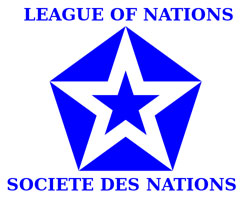|
 The
League of Nations was the first international
organization that was created for the
purpose of promoting world peace. It was
formed after the end of World War I during
the Paris Peace Conference, with a wide-ranging
set of goals, including settling international
disagreements through arbitration and
negotiation; preventing wars through disarmament
and collective security; promoting health
and humanitarian relief; and abolishing
slave labor and illegal drug trafficking.
Many of the ideas in the organization's
charter, and its name, were inspired by
US President Woodrow Wilson's "Fourteen
Points" proposal, which had helped to
secure the armistice and peace negotiations
that ended the First World War. The idea
of using diplomacy to settle tensions
and disputes was a fundamental paradigm-shift
from the pervading consciousness in Europe
over the previous century. Nationalistic
patriotism had fanned the flames of aggressive
competition and distrust between nations,
resulting in an ongoing preparation-for-war
mentality and massive buildup of arms,
ultimately erupting into the first global
war which killed 9 million people. The
League of Nations was the first international
organization that was created for the
purpose of promoting world peace. It was
formed after the end of World War I during
the Paris Peace Conference, with a wide-ranging
set of goals, including settling international
disagreements through arbitration and
negotiation; preventing wars through disarmament
and collective security; promoting health
and humanitarian relief; and abolishing
slave labor and illegal drug trafficking.
Many of the ideas in the organization's
charter, and its name, were inspired by
US President Woodrow Wilson's "Fourteen
Points" proposal, which had helped to
secure the armistice and peace negotiations
that ended the First World War. The idea
of using diplomacy to settle tensions
and disputes was a fundamental paradigm-shift
from the pervading consciousness in Europe
over the previous century. Nationalistic
patriotism had fanned the flames of aggressive
competition and distrust between nations,
resulting in an ongoing preparation-for-war
mentality and massive buildup of arms,
ultimately erupting into the first global
war which killed 9 million people.
The
League of Nations held its first meetings
in 1920, but in many ways it was doomed
to failure. Although US President Woodrow
Wilson had proposed the idea, the United
States Congress refused to allow America
to join. Germany wasn't allowed to be
a member of the international community
as punishment for its role in starting
World War I, and neither was Russia, because
of fear about its communist government.
In addition to missing these three powerful
nations, the resources of the League's
two remaining leading nations, Britain
and France, had been severely drained
during the war, and they were not overly
enthusiastic about becoming involved in
disputes that didn't directly affect Western
Europe. The League did not have a military
force, but relied on sanctions and boycotts
to try to convince members to adhere to
its decisions. Over the next two decades,
the League encountered many successes
and failures: some wars over border-disputes
were averted, drug trafficking and slave
labor practices were being addressed,
the League's Health Organisation was making
progress in combating diseases, and much
humanitarian relief was provided for refugees
and those affected by famine crises. But
in the 1930s, international disagreements,
disputes and military conflicts and invasions
grew, ultimately resulting in the Second
World War by 1939. The League did not
meet during World War II, and after the
United Nations was created in 1945, its
authority and some of its infrastructure,
like the Health Organisation, was taken
over by the UN.
|